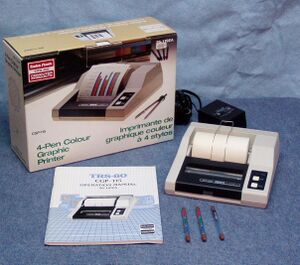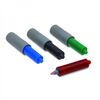CGP-115

Manuals
ALPS Plotter Engine
The Tandy CGP-115 is based on the same ALPS DPG-1302 plotter engine as several other plotters.
Plotter Models:
- ALPS DPG-1302
- Aquarius 4-COLOR PRINTER
- Astron MCP-40X
- Atari 1020
- Canon X-710
- Casio FA-10
- Casio FA-11
- Commodore 1520
- Convergent Microprinter WP-100
- Mattel Aquarius 4615
- MCP-40 (not the Oric one)
- Olivetti PL 10
- Oric MCP-40
- Sega SP-400
- Sharp CE-1600P
- Sharp MZ-1P01
- Sharp MZ-1P16
- Silver Reed EB50
- Tandy CGP-115
- Texas Instruments HX-1000
- Vtech Laser PP-40I
There is another version of the same ALPS engine that just takes narrower paper, but is otherwise the same, using the same pens and pinion gears.
- Sharp CE-150
- Tandy 26-3605
And another version that takes wider paper.
- Panasonic Penwriter RK-P400
- Sharp CE-515P
- Sharp CE-516P
- Sony PRN-C41
Pens

A German medical supplies company is manufacturing new pens designed for this plotter mechanism.
They're expensive, especially with the shipping, but, they're new, and you can refill them practically forever for pennies per refill.
https://www.evident-shop.de/en/search?sSearch=stifte
Gears
The pinion/spindle gears on the X and Y motors are made of Nylon, which has shrunk over time, and essentially all of these gears are split by now, or soon will be.
Specs
- 13 tooth
- 0.25 modulus
- 1.5mm bore
- 4.5mm length
These are the specs to re-create the gear from scratch. For example the FreeCAD model below was made by just plugging those values into the involute gear plugin in FreeCAD.
Sources
The original gears are nylon. You can't get those any more, but you can get two other forms of new gears.
Jeff Birt of the "Hey Birt!" Youtube channel has commissioned some machined brass gears: https://www.soigeneris.com/alps-printer-plotter-mechanism-pinion-gears
You can also get 3d-printed gears: http://shpws.me/Si9K
CAD model source for the 3d-printed gears: https://github.com/bkw777/ALPS_plotter_gears
To install brass gears, I used a small hobby/electronics table-top vise with plastic jaws (Panavise 301) to press the gears onto the motor shafts without deforming the end of the shaft. The rear end of the shaft is very close to the bearing and so you want to be extra careful to avoid even a tiny impreceptible damage to the shape of the shaft. You can remove a thin metal sheet that covers the motors on the back, and that exposes the motors enough to get the corners of the vise jaws on both ends of the motor shaft without having to remove the motors. The jaws on that model of vise are plastic, so they don't harm the motor shaft on the back of the motors. If you use a steel jaw vice, be sure to protect the rear motor shaft from direct metal to metal contact with the vice jaw, to prevent the vise jaw from deforming the motor shaft.
Paper
Specs
- plain bond
- 4.5" wide
- 7/16" core
- up to 3" diameter
- 160 feet
Original Radio Shack item was 180 feet but that's not a common size. The Original paper may have been a thinner bond too. 160 feet of plain bond does fit in the machine with room to spare. Often the selling sites will list the roll diameter which removes all guessing.
Typical search term: "4.5" bond roll"
http://www.itplanet.com/parts/Star__87999850.htm
https://www.cibowares.com/4-5-x-160-white-bond-1-ply-register-roll-package-of-20/
http://www.sunshinesupport.com/prod/receipt-paper-rolls/1-ply-45-inch-x-165-paper-25-rolls-45165.htm
Refilling Pens
The new pens from the German medical supplies company are pretty expensive considering that they are so small and don’t last very long.
The new pens can be refilled fairly easily with insulin syringes available from local drug stores. Example:
- Walgreens item 677232
- 10-pack, 29 gauge, 0.3mL
- super thin syringes for insulin
When looking for alternative inks, you need to know that the original ink is water-based.
You want to use an ink that is water-based, and uses dye not pigment. In other words, not India ink! That has pigments made of particulates like a paint. That clogs up the wick fibers and the ball and wrecks the pen. You need inks that are purely liquid, which means dyes not pigments.
The simplest way to identify a good ink is to search for water-based drafting/plotter pen ink.
These Koh-I-Noor/Chartpak model numbers are perfect:
- 3080-F-BLA black
- 3080-F-BLU blue
- 3080-F-RED red
- 3080-F-GRE green
Fill a syringe to about the 20 mark. (0.2ml)
Around the tip of the pen (the new plastic german ones) there are 3 vent holes. Insert the syringe into one of those. Angle towards the center a little to minimize how much the vent passage gets mushed open by the needle.
Slowly, giving the ink time to soak into the fiber filler inside, push the plunger from about 20 to about 10. When you see ink in the other vent holes, you’ve actually gone slightly too far, or too fast.
Put the printer in 80 column mode ( jumper 2 = off ) and LLIST a basic program until the writing looks clean. It may splatter a little at first.
Clean up with a calligraphy pen cleaning solution, like:
or Koh-I-Noor Rapido-Eze.
It works to restore old dried pens too if you soak the disassembled parts in a jar for a day or so. Most original (30 year old) pens are not recoverable, but some are.
I have no idea how many times a pen can be refilled before the ball point wears out, but even once is worth it, considering how expensive they are and how quickly they run out. I have only refilled each color about twice so far.
For the original steel barrel pens:
You have to completely disassemble the pens and soak the parts in the cleaning solution for a few hours, or even days.
If the metal ball point still does not roll or flow, try passing the tip into a flame briefly to free up the ball from being stuck. This is just for METAL tips! I don't know if it works by melting the dried ink or by expanding the metal around the ball, but it works. It only takes a brief exposure, less than a second. Just pass it above a flame back and forth once or twice, don't hold it in place. This breaks the ball free and allows the ball to roll again, and the ink to flow again.
You have to inject ink with the pen tip off. You can’t go in through a vent hole like you can for the new plastic pens.
All in all, I’ve generally had less than 50% success rate refilling and reviving old pens. Even after completely disassembling and cleaning all parts and freeing the stuck ball points. But occasionally it does work, and a few pens are better than no pens.
Pen/Ink Storage
Store pens and ink in something that is more vapor-proof than oridinary plastic bags or boxes. You want metal or glass, like glass jars with metal lids or foil bags with actual aluminum foil not merely a silvery appearance.
The plastic ink bottles and pen bodies will lose both alcohol and water right through the plastic over time. If they are stored in ordinary plastic bags or containers, even with seals, the vapor pases right through that plastic over time the same way. So you want to store them inside something that will actually trap the vapor inside over long periods, which slows down the loss of volotiles from the ink. Metal in particular also protects the dye from UV.
Example: https://www.amazon.com/dp/B006L80T2O/
This item comes with dessicant packs. Do NOT include the dessicant packs! The whole point is to keep the moisture trapped IN the bag.
Pics / Video
https://goo.gl/photos/8HNKcnyMKBJupYnq9
Other
M100SIG Archive
https://github.com/LivingM100SIG/Living_M100SIG/blob/main/M100SIG/Lib-06-GRAPHICS-MUSIC/BIORTH.CGP
https://github.com/LivingM100SIG/Living_M100SIG/blob/main/M100SIG/Lib-03-TELCOM/RLECGP.115
https://github.com/LivingM100SIG/Living_M100SIG/blob/main/M100SIG/Lib-09-PERIFERALS/CGP115.THD
https://github.com/LivingM100SIG/Living_M100SIG/blob/main/M100SIG/Lib-07-UTILITIES/BCODE2.BAS
https://github.com/LivingM100SIG/Living_M100SIG/blob/main/M100SIG/Lib-04-APPS/GRAPH.DOC
https://github.com/LivingM100SIG/Living_M100SIG/blob/main/M100SIG/Lib-05-GAMES/WRDSCH.DOC
https://github.com/LivingM100SIG/Living_M100SIG/blob/main/M100SIG/Lib-04-APPS/GRAPH.100
https://github.com/LivingM100SIG/Living_M100SIG/blob/main/M100SIG/Lib-09-PERIFERALS/TP-10.THD
https://github.com/LivingM100SIG/Living_M100SIG/blob/main/M100SIG/Lib-06-GRAPHICS-MUSIC/GPRINT.100
https://github.com/LivingM100SIG/Living_M100SIG/blob/main/M100SIG/Lib-06-GRAPHICS-MUSIC/GPRINT.DOC
https://github.com/LivingM100SIG/Living_M100SIG/blob/main/M100SIG/Lib-06-GRAPHICS-MUSIC/GRFX.100
https://github.com/LivingM100SIG/Living_M100SIG/blob/main/M100SIG/LIB-13-REVIEWS/OLIM10.DIF
https://github.com/LivingM100SIG/Living_M100SIG/blob/main/M100SIG/Lib-07-UTILITIES/PRTCGP.115
https://github.com/LivingM100SIG/Living_M100SIG/blob/main/M100SIG/LIB-13-REVIEWS/APLOT.115
TANDY faxback
http://ftp.oldskool.org/pub/tvdog/tandy1000/faxback/04000.txt Selecting a Printer Cable
http://ftp.oldskool.org/pub/tvdog/tandy1000/faxback/04001.txt Care and Maintenance
http://ftp.oldskool.org/pub/tvdog/tandy1000/faxback/04002.txt Using Control Codes From BASIC
http://ftp.oldskool.org/pub/tvdog/tandy1000/faxback/05632.txt Catalog Listing
5633 - Cables
http://ftp.oldskool.org/pub/tvdog/tandy1000/faxback/05634.txt Control Codes
http://ftp.oldskool.org/pub/tvdog/tandy1000/faxback/05635.txt Features
http://ftp.oldskool.org/pub/tvdog/tandy1000/faxback/05636.txt Paper Loading
http://ftp.oldskool.org/pub/tvdog/tandy1000/faxback/05637.txt Pen Installation
http://ftp.oldskool.org/pub/tvdog/tandy1000/faxback/05638.txt Pinouts
http://ftp.oldskool.org/pub/tvdog/tandy1000/faxback/05639.txt Self-Test
http://ftp.oldskool.org/pub/tvdog/tandy1000/faxback/05640.pdf Dip Switches
http://ftp.oldskool.org/pub/tvdog/tandy1000/faxback/05641.txt Specifications